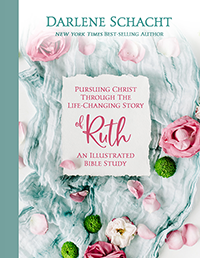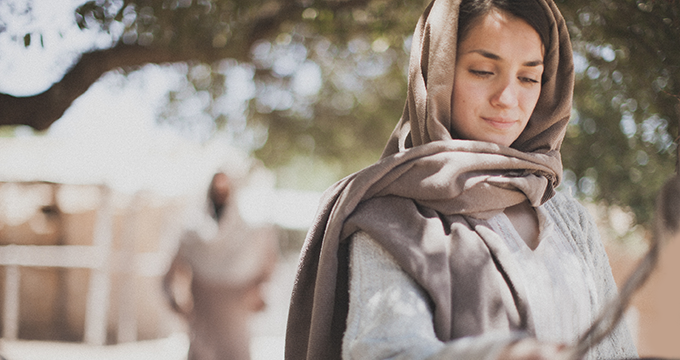 Our 4-week Bible study on the book of Ruth continues with chapter 2. Each week we’ll focus on one of the four chapters. On Mondays, I’ll give you a little background information on each chapter, some questions to answer during the week (which will take you beyond the book of Ruth) and a challenge for the week.
Our 4-week Bible study on the book of Ruth continues with chapter 2. Each week we’ll focus on one of the four chapters. On Mondays, I’ll give you a little background information on each chapter, some questions to answer during the week (which will take you beyond the book of Ruth) and a challenge for the week.
You’ll see that the questions are interspersed throughout the text below. I kept them that way so that you are answering them both in order and in the context of the ideas I’m expanding on.
I’ll return each Friday with my thoughts on the chapter and encouraging words that offer practical application.
If you haven’t done so already, you can purchase a copy of the study guide at Amazon. Click here.
If you don’t want to purchase a study guide, you don’t have to. Everything you need for the study will be provided for you each Monday right here on the blog.
If you missed week one, click here to find them on my home page: https://timewarpwife.comTime-Warp Wife
If you haven’t done so already, make sure to subscribe, so you don’t miss a post: 
Ruth Chapter 2 – I Have Found Grace in Thine Eyes

“And God raised us up with Christ and seated us with him in the heavenly realms in Christ Jesus, in order that in the coming ages he might show the incomparable riches of his grace, expressed in his kindness to us in Christ Jesus.” – Ephesians 2:6-7, NIV
THE LAW OF GLEANING
Before we get into Chapter 2, let’s take a look at the law of gleaning. In Leviticus we see that the law was put in place to aid the poor. What we see here is God’s kindness, compassion, and grace. From the Old Testament through to the New we see the tender side of God Who is a father to the fatherless, a protector of widows and an advocate of the poor.
What are some of the stipulations regarding the harvest that God outlined in Leviticus 19:9-10?
Did the law of gleaning only pertain to barley and wheat? If not, what else did God include? See Deuteronomy 24:19-22, NIV
REFLECTING THE LOVE AND COMPASSION OF CHRIST
Casting Crowns said it well when they sang, “We are the body of Christ, but if we are the body why aren’t His arms reaching?”
Boaz is a shining example of faith in action. From the very moment we’re introduced to him we sense that he is a man full of joy, compassion, and grace. In fact, the first words out of his mouth were, “The Lord be with you,” when he walked onto his field to greet the workers. The next thing he did was welcome Ruth onto his field to glean alongside his workers.
The fact is that we’re all given the same opportunity to reflect God’s compassion and grace through our lives, but too often we waste it.
There’s a popular quote that says, “You may be the only Bible some people read.” It’s true in a sense, and so, it’s important that we examine ourselves to see what message we’re sending out. Are we reaching out to others as Christ reached out to us? Are we extending grace to those who are difficult, undeserving, unkind…? Or are we so caught up in our own worlds that we don’t notice others?
Ruth was a foreigner, and as we discovered in Chapter One, she was also a Moabite–not a popular reputation to have had when you’re surrounded by Hebrews. And, as a matter of fact, this was the first thing the overseer told Boaz when Boaz inquired about the new girl.
“She is the Moabite who came back from Moab with Naomi.” He said. He could have simply told Boaz that she was Naomi’s daughter-in-law, but instead, he seized the opportunity to point out her flaws.
That’s how life is sometimes—and for some of us too often, unfortunately. We’re so quick to recognize the faults in one another that we fail to extend compassion and grace.
THE WISDOM OF MISS CLARA
If you’re not familiar with The War Room, I urge you to sit down and watch it tonight. You won’t be sorry, I promise. It’s a powerful reminder not only to pray, but to also love with compassionate grace.
For those of you who are familiar with the movie, I want to bring you back to the scene where Miss Clara sits down in the living room with Elizabeth. Elizabeth hands over a long list of grievances she has with her husband—three pages in fact.
“You’ll get the gist of it, when you read it,” she says, passing the list to Miss Clara.
Without skipping a beat, Miss Clara poses a question, “Actually, I’m not gonna read it.” She says, “My question to you is this: in light of all of these wrongs, does God still love Tony?”
After Elizabeth points out that her love for Tony is buried under a lot of frustration, Miss Clara replies, “So, he needs grace.”
“I don’t know if he deserves grace,” Elizabeth sighs.
“Do you deserve grace?” Clara asks.
And with that, I’m convicted. I’m reminded of all the times I’ve shortchanged someone’s character because they didn’t measure up to my expectations. The days when I’ve been more frustrated with people than loving. And the wasted opportunities I’ve let slip by when I could have extended God’s compassion and grace but I didn’t.
He gave up His life for us while we were yet sinners. And what did He say about those who whipped Him, spat in His face, and crucified Him? “Father forgive them for they know not what they do.” (Luke 23:34)
It’s that kind of grace that speaks volumes. And the same kind of grace that we need to be putting into action if we hope to preach Christ.
I have a t-shirt in my closet that reads, “Love first, ask questions later.” It’s a reminder for me to give before I judge. Better yet, it’s a reminder to give without judgment. Oh, if we could all love as Christ loved, this world would be a better place, wouldn’t it?
REACHING OUT TO THE POOR
“Don’t shine so that others can see you. Shine so that through you, others can see Him.” – C.S. Lewis
What does Matthew chapter 25:34-40 teach us about reaching out to the poor and helping those in need?
What warning does Jesus give to those who don’t reach out the poor and help those in need? See Matthew 25:41-46
THE LAW OF REDEMPTION
In this chapter, we sense Naomi’s excitement as she tells Ruth that Boaz is both a close relative and one of their “kinsman redeemers.” The Hebrew word for kinsman redeemer is “ga’al,” which is a primitive root, to redeem (according to the Oriental law of kinship), i.e. to be the next of kin (and as such to buy back a relative’s property, marry his widow, etc. (Strong’s H1350)
What was the law of widowhood and marriage according to Deuteronomy 25:5-7?
What else did the law of redemption include besides the marriage of widows? Leviticus 25:25-28 & 47-48
Who was the woman in Genesis 38:6-26? How did her in-laws fail her? And what lengths did she go to in order to ensure that she received her due kinsman redemption?
The reason that kinsman redemption was so important to God is two-fold (or perhaps 1000-fold as I could never presume to know the mind of God). One reason is because the promise made to Abraham was that all nations would be blessed through his offspring. There was an understanding that the coming Messiah would be born through the line of Abraham’s seed. And so, in Genesis 38, when Onan spilled his seed on the ground instead of redeeming his brother’s wife, he failed to honor the Lord. He didn’t recognize the importance of his seed and the responsibility that the Hebrews had in carrying on the lineage of Christ.
The angel of the Lord called to Abraham from heaven a second time and said, “I swear by myself, declares the Lord, that because you have done this and have not withheld your son, your only son, I will surely bless you and make your descendants as numerous as the stars in the sky and as the sand on the seashore. Your descendants will take possession of the cities of their enemies, and through your offspring all nations on earth will be blessed because you have obeyed me.” – Genesis 22:15-18, NIV
Another reason I believe that kinsman redemption was important to God, is that it pointed the way to Jesus, our Kinsman Redeemer. It was a shadow of something, or rather someone, much greater to come. He paid the ransom for us when He laid down His life. And is He our kinsman? He is a close relative indeed, as we are created by Him and in His own image. In fact, you can’t be any more closely related than that.
For you know that it was not with perishable things such as silver or gold that you were redeemed from the empty way of life handed down to you from your ancestors, but with the precious blood of Christ, a lamb without blemish or defect. – 1 Peter 1:18-19
Look up Matthew chapter 1 to find the genealogy of Jesus Christ. List the five women that you find there. One is listed as “Uriah’s wife.” Google that one to find out who she was.
It’s interesting to note that within the genealogy of Christ, four of the five women listed had a bad reputation. Tamar posed as a prostitute in order to get pregnant by her father-in-law Judah, Rahab was a prostitute that hid the men who came to spy on Jericho (she was Boaz’s mother by the way). Bathsheba had an affair with King David while she was still Uriah’s wife. And as we discussed in Chapter 1, Ruth was a Moabite, a nation despised among the Jews. Again, this goes to show us the compassion and grace of God.
RUTH SERVES NAOMI
In this chapter we see that Ruth offers to go to work for Naomi. Again, we see loving kindness from this young woman who has vowed to stand by her mother-in-law. It’s rare to see this kind of care and devotion between a mother and daughter, not to mention the fact that they were in-laws which makes this relationship all the more incredible.
As my children were growing up, I’ve always made a point (and still do) to remind them to honor me in some way on Mother’s Day. “It’s not merely for my sake.” I tell them, “I’m training you to honor your mother-law whoever she may turn out to be.”
It’s made a difference in their lives. In fact, when my daughter got married, she asked her mother-in-law to be her maid of honor. Of course, she was concerned it might bother me or cause me to be jealous, but the fact is that I couldn’t have been more pleased with her decision to embrace her husband’s mother as her very own. I saw the compassion and grace of God in the decision she made and I still see it going strong. Oh, that we were all like Ruth when it came to our in-laws!
Servitude is a virtue. We see it here in the character of Ruth as she goes off to work, and again in Proverbs chapter 31. Note the hard-working characteristics of the virtuous woman found in Proverbs chapter 31:
- Works with eager hands. (13)
- Provides food for her family (15)
- She considers a field and buys it; out of her earnings she plants a vineyard. (16)
- She sets about her work vigorously; her arms are strong for her tasks. (17)
- She sees that her trading is profitable, (18)
- She makes coverings for her bed; (22)
- She makes linen garments and sells them and supplies the merchants with sashes. (24)
The Bible tells us that we are to value others and to put their interests above our own. The thing is that God never asks us to do anything that He wasn’t willing to do himself. If He asks us to serve in humility, we can be sure that He was also willing to serve.
Look up Philippians 2:6-8. What do we learn about the character of Christ from these verses?
HE SEEKS US, SERVES US, SAVES US, AND SHOWERS US WITH HIS GRACE
Verse three tells us that Ruth “haps” on the field of Boaz which is to say that she was there by chance. The thing is however, we know that nothing in the Bible happened by “chance.” What is too often viewed as “good fortune” is the divine orchestration of God. He’s composed every single detail of every single story from Genesis to the book of Revelation, and in fact, every part of your life is in His hands. He’s always at work behind the scenes designing the finest details of your story. There isn’t a single breath that you take without God knowing about it, there isn’t a single step that you take without His divine providence.
We see a shadow of our coming Redeemer through the actions of Boaz who enters the field and immediately seeks to save and protect Ruth. He invites her to stay and continue to glean in his field, while he instructs the men there to leave her alone. Her well-being is a priority to him, which would have been a great relief to Ruth in those days. It wasn’t always safe for women to work alone in the fields, especially a woman as young and attractive as her.
He then goes on to invite her to eat at his table, where he personally serves Ruth himself. Can you imagine the excitement these women shared later that night when she returned with an ephah of barley (that’s about 30 pounds) and a smile on her face? It was time to play matchmaker, and Naomi was ready.
In David Platt’s sermon on the book of Ruth, he points out four marks, or characteristics, of a redeemer. As I list them here for you, find the verse (or verses) within this chapter that point to each mark and list it:
- He seeks the destitute as his family.
- He saves the destitute from harm.
- He serves the destitute at his table.
- He showers the destitute with his grace.
Boaz could have simply been kind to Ruth, and left it at that, but he took it a step further. In fact, he took it much further as he sought to protect her, to provide for her, and to draw her closer to him. Bestowing a great honor upon Ruth, he invited her to share at his table, where he personally served Ruth himself.
“Come over here,” he says, “have some bread and dip it in the wine vinegar.” When she sat down with the harvesters, he offered her some roasted grain. She ate all she wanted and had some left over. (v. 14)
Compare this with our relationship with Jesus. He’s never kept us at a distance as one might expect from the King of all kings and the Lord of all lords. In fact, His desire has always been to draw us close, and to fellowship with us as friends.
I no longer call you servants, because a servant does not know his master’s business. Instead, I have called you friends, for everything that I learned from my Father I have made known to you. – John 15:15, NIV
We didn’t go looking for Christ, but rather He came looking for us. And when we failed to see Him, He pursued us again, and again…
“If a man owns a hundred sheep,” Jesus said, “and one of them wanders away, will he not leave the ninety-nine on the hills and go to look for the one that wandered off?”
For this is what the Sovereign Lord says: I myself will search for my sheep and look after them. As a shepherd looks after his scattered flock when he is with them, so will I look after my sheep. I will rescue them from all the places where they were scattered on a day of clouds and darkness. I will bring them out from the nations and gather them from the countries, and I will bring them into their own land. I will pasture them on the mountains of Israel, in the ravines and in all the settlements in the land. I will tend them in a good pasture, and the mountain heights of Israel will be their grazing land. There they will lie down in good grazing land, and there they will feed in a rich pasture on the mountains of Israel. I myself will tend my sheep and have them lie down, declares the Sovereign Lord. – Ezekiel 34:11-15, NIV
How wonderful is our God! He seeks us, He saves us, He serves us, and He showers us with His grace.
I’m reminded of the beautiful words from Song of Solomon which read, “He brought me to the banqueting house, and his banner over me was love.” (Song of Solomon 2:4)
GOD’S TIMING IS IMPECCABLE
Ruth stayed close to the handmaidens of Boaz and gleaned in his fields through the barley harvest and the wheat harvest. It’s interesting to note that the first chapter ends at the barley harvest—remember that would have been during Passover week, which ends with the Feast of First Fruits. The second chapter ends by mentioning the wheat harvest. This is not a coincidence, but rather God’s impeccable timing yet again. I love it!
Note the two harvests mentioned in the book of Ruth:
April-May – The Barley Harvest, corresponds to The Passover and the Feast of First Fruits when both Jews and Gentiles were united as one by grace through faith in Jesus Christ.
June-July – The Wheat Harvest, lines up with (Shavuot) “The Feast of Weeks” also known as the day of Pentecost. It’s called the Feast of Weeks because they count off 7 full weeks from the day after the weekly Sabbath that falls during Passover week. Because it was 50 days after the resurrection of Christ it’s also called “Pentecost.”
It was during this wheat harvest that Ruth is betrothed to Boaz as we will see in the next chapter. This betrothal foreshadows the day of Pentecost, in Acts Chapter 2 when God established His church (His bride) by pouring out His spirit upon all believers. The timing also coincides with the covenant made between God and Israelites at the foot of Mt. Sinai in Exodus Chapter 19.
Francis Chan writes, “The very fact that a holy, eternal, all-knowing, all-powerful, merciful, fair, and just God loves you and me, is nothing short of astonishing.”
You are loved by an almighty God,
Darlene Schacht
The Time-Warp Wife
P.S. I’ll see you on Friday for part two of chapter two.
Considering a gift to Time-Warp Wife Ministries? Click here to donate.
THIS WEEK’S CHALLENGE
Love first, ask questions later. Make an effort to extend patience, grace, and kindness to others. Look for the best in others before you assume the worst. Don’t jump to conclusions, but seek to understand their point of view.
BIBLE VERSE
And God raised us up with Christ and seated us with him in the heavenly realms in Christ Jesus, in order that in the coming ages he might show the incomparable riches of his grace, expressed in his kindness to us in Christ Jesus. – Ephesians 2:6-7, NIV
ABOUT THE AUTHOR

Darlene Schacht and her husband Michael live in Manitoba Canada where the summers are beautiful and the winters are cold. Together they’ve come to learn that relationships aren’t always easy, but that marriage, the way God intended it to be, is a treasure worth fighting for.
She began her publishing journey about twelve years ago when she pioneered one of the first online magazines for Christian women, known at the time as “Christian Women Online Magazine.” After three years, Darlene left CWO to blog as a solo author at Time-Warp Wife Ministries.
It was also during this transition that she worked alongside actress Candace Cameron Bure to write the NYT Best-Selling book, Reshaping it All: Motivation for Spiritual and Physical Fitness. Reshaping it All was the winner of both the 2011 USA Best Book Awards and the 2012 Christian Reading Retailers Choice Awards.
Author of more than 15 books, Darlene continues to write and to minister to her readers through her blog at TimeWarpWife.com.
Connect with Darlene:
Facebook: @timewarpwife
Instagram: @timewarpwife
Pinterest: @timewarpwife
Twitter: @timewarpwife
Have You Ordered Your Planner Yet?
The 2019 Inspirational Planner:
Organize Your Life in One Book
Beauty and organization make The Inspirational Planner a book every Christian woman must have!

